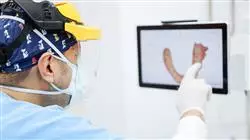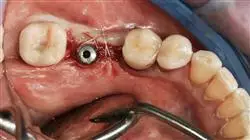University certificate
The world's largest faculty of dentistry”
Introduction to the Program
In just 12 months you will be aware of the latest clinical and digital trends in oral rehabilitation"

The various studies on dental loss relate this absence to the appearance of diseases of the stomatognathic apparatus. An effect, on many occasions, unknown to patients who come to the dental office for repair or replacement for aesthetic reasons. Whatever the rehabilitative purpose, in recent years there have been significant advances due to new technologies that have improved the manufacture of dental pieces and their adaptation to the patient's oral characteristics.
These advances have led dental professionals to be aware of them and to include them in their daily clinical practice. In order to promote this update, TECH has developed this online university program, designed and developed by an excellent team of professionals in this area.
It is an advanced program that will take the graduate over 1,500 hours of study to delve into the most relevant digital dental advances, laboratory work, as well as the most effective techniques of prevention, diagnosis and treatment used in the most recurrent pathologies. For this, it also includes video summaries of each topic, videos in detail, specialized readings and clinical cases, provided by the teachers of this program.
Likewise, graduates will be able to balance their daily responsibilities with an education that gives them flexibility and self-management of their study time. And the fact is that, without the need to go to a center in person, or have classes with fixed schedules, students can access the syllabus of this program at any time of the day and from any electronic device with an Internet connection.
Undoubtedly, a unique educational option in accordance with the current times.
An educational option that will bring you up to date on the most resistant materials used in the realization of dental prostheses"
This Professional master’s degree in Dental Prosthesis contains the most complete and up-to-date scientific program on the market. The most important features include:
- The development of case studies presented by experts in Dental Prosthesis, Implantology and Oral Rehabilitation
- The graphic, schematic and practical contents with which it is conceived provide scientific and practical information on those disciplines that are essential for professional practice
- Practical exercises where self-assessment can be used to improve learning
- Its special emphasis on innovative methodologies
- Theoretical lessons, questions to the expert, debate forums on controversial topics, and individual reflection assignments
- Content that is accessible from any fixed or portable device with an Internet connection
You will be provided with clinical cases brought by leading experts in Dentistry with which you will be able to update your knowledge in Dental Prosthesis "
The program's teaching staff includes professionals from the sector who bring to this program the experience of their work, in addition to recognized specialists from prestigious reference societies and universities.
The multimedia content, developed with the latest educational technology, will provide the professional with situated and contextual learning, i.e., a simulated environment that will provide immersive education programmed to learn in real situations.
This program is designed around Problem-Based Learning, whereby the professional must try to solve the different professional practice situations that arise during the course. For this purpose, the students will be assisted by an innovative interactive video system created by renowned and experienced experts.
Delve into the approach to periprosthetic tissues to maintain their integrity and achieve a successful prosthetic rehabilitation"

The multimedia material in this program will allow you to update you on soft tissue management, impression materials and techniques used in oral rehabilitation"
Why study at TECH?
TECH is the world’s largest online university. With an impressive catalog of more than 14,000 university programs available in 11 languages, it is positioned as a leader in employability, with a 99% job placement rate. In addition, it relies on an enormous faculty of more than 6,000 professors of the highest international renown.

Study at the world's largest online university and guarantee your professional success. The future starts at TECH”
The world’s best online university according to FORBES
The prestigious Forbes magazine, specialized in business and finance, has highlighted TECH as “the world's best online university” This is what they have recently stated in an article in their digital edition in which they echo the success story of this institution, “thanks to the academic offer it provides, the selection of its teaching staff, and an innovative learning method aimed at educating the professionals of the future”
A revolutionary study method, a cutting-edge faculty and a practical focus: the key to TECH's success.
The most complete study plans on the university scene
TECH offers the most complete study plans on the university scene, with syllabuses that cover fundamental concepts and, at the same time, the main scientific advances in their specific scientific areas. In addition, these programs are continuously being updated to guarantee students the academic vanguard and the most in-demand professional skills. In this way, the university's qualifications provide its graduates with a significant advantage to propel their careers to success.
TECH offers the most comprehensive and intensive study plans on the current university scene.
A world-class teaching staff
TECH's teaching staff is made up of more than 6,000 professors with the highest international recognition. Professors, researchers and top executives of multinational companies, including Isaiah Covington, performance coach of the Boston Celtics; Magda Romanska, principal investigator at Harvard MetaLAB; Ignacio Wistumba, chairman of the department of translational molecular pathology at MD Anderson Cancer Center; and D.W. Pine, creative director of TIME magazine, among others.
Internationally renowned experts, specialized in different branches of Health, Technology, Communication and Business, form part of the TECH faculty.
A unique learning method
TECH is the first university to use Relearning in all its programs. It is the best online learning methodology, accredited with international teaching quality certifications, provided by prestigious educational agencies. In addition, this disruptive educational model is complemented with the “Case Method”, thereby setting up a unique online teaching strategy. Innovative teaching resources are also implemented, including detailed videos, infographics and interactive summaries.
TECH combines Relearning and the Case Method in all its university programs to guarantee excellent theoretical and practical learning, studying whenever and wherever you want.
The world's largest online university
TECH is the world’s largest online university. We are the largest educational institution, with the best and widest online educational catalog, one hundred percent online and covering the vast majority of areas of knowledge. We offer a large selection of our own degrees and accredited online undergraduate and postgraduate degrees. In total, more than 14,000 university degrees, in eleven different languages, make us the largest educational largest in the world.
TECH has the world's most extensive catalog of academic and official programs, available in more than 11 languages.
Google Premier Partner
The American technology giant has awarded TECH the Google Google Premier Partner badge. This award, which is only available to 3% of the world's companies, highlights the efficient, flexible and tailored experience that this university provides to students. The recognition as a Google Premier Partner not only accredits the maximum rigor, performance and investment in TECH's digital infrastructures, but also places this university as one of the world's leading technology companies.
Google has positioned TECH in the top 3% of the world's most important technology companies by awarding it its Google Premier Partner badge.
The official online university of the NBA
TECH is the official online university of the NBA. Thanks to our agreement with the biggest league in basketball, we offer our students exclusive university programs, as well as a wide variety of educational resources focused on the business of the league and other areas of the sports industry. Each program is made up of a uniquely designed syllabus and features exceptional guest hosts: professionals with a distinguished sports background who will offer their expertise on the most relevant topics.
TECH has been selected by the NBA, the world's top basketball league, as its official online university.
The top-rated university by its students
Students have positioned TECH as the world's top-rated university on the main review websites, with a highest rating of 4.9 out of 5, obtained from more than 1,000 reviews. These results consolidate TECH as the benchmark university institution at an international level, reflecting the excellence and positive impact of its educational model.” reflecting the excellence and positive impact of its educational model.”
TECH is the world’s top-rated university by its students.
Leaders in employability
TECH has managed to become the leading university in employability. 99% of its students obtain jobs in the academic field they have studied, within one year of completing any of the university's programs. A similar number achieve immediate career enhancement. All this thanks to a study methodology that bases its effectiveness on the acquisition of practical skills, which are absolutely necessary for professional development.
99% of TECH graduates find a job within a year of completing their studies.
Professional Master's Degree in Dental Prosthesis
The specialty in Dental Prosthesis is essential for the recovery of dental functionality and esthetics in patients who have suffered the loss of one or more teeth. At TECH Global University we have designed our Professional Master's Degree program in Dental Prosthetics to provide complete and up-to-date training to dental professionals who wish to specialize in this field of work. During the Professional Master's Degree, students will delve into the study of the different techniques and materials currently available for the elaboration of dental prostheses, as well as the planning and management of clinical cases.
The main objective of our Professional Master's Degree program is to provide a complete and updated training for dental professionals who wish to specialize in this field.
The main objective of our Professional Master's Degree in Dental Prosthesis is to train highly updated professionals, capable of offering quality and personalized solutions to each of their patients. The program will address topics such as fixed, removable, implant-supported prosthesis, hybrid prosthesis and occlusion, among others. In addition, students will acquire knowledge in complementary areas such as periodontics, orthodontics and surgery, which will allow them to have a comprehensive view of the treatment of patients with dental problems. They will also work on the improvement of technical and clinical skills, with supervised practice on real cases.







